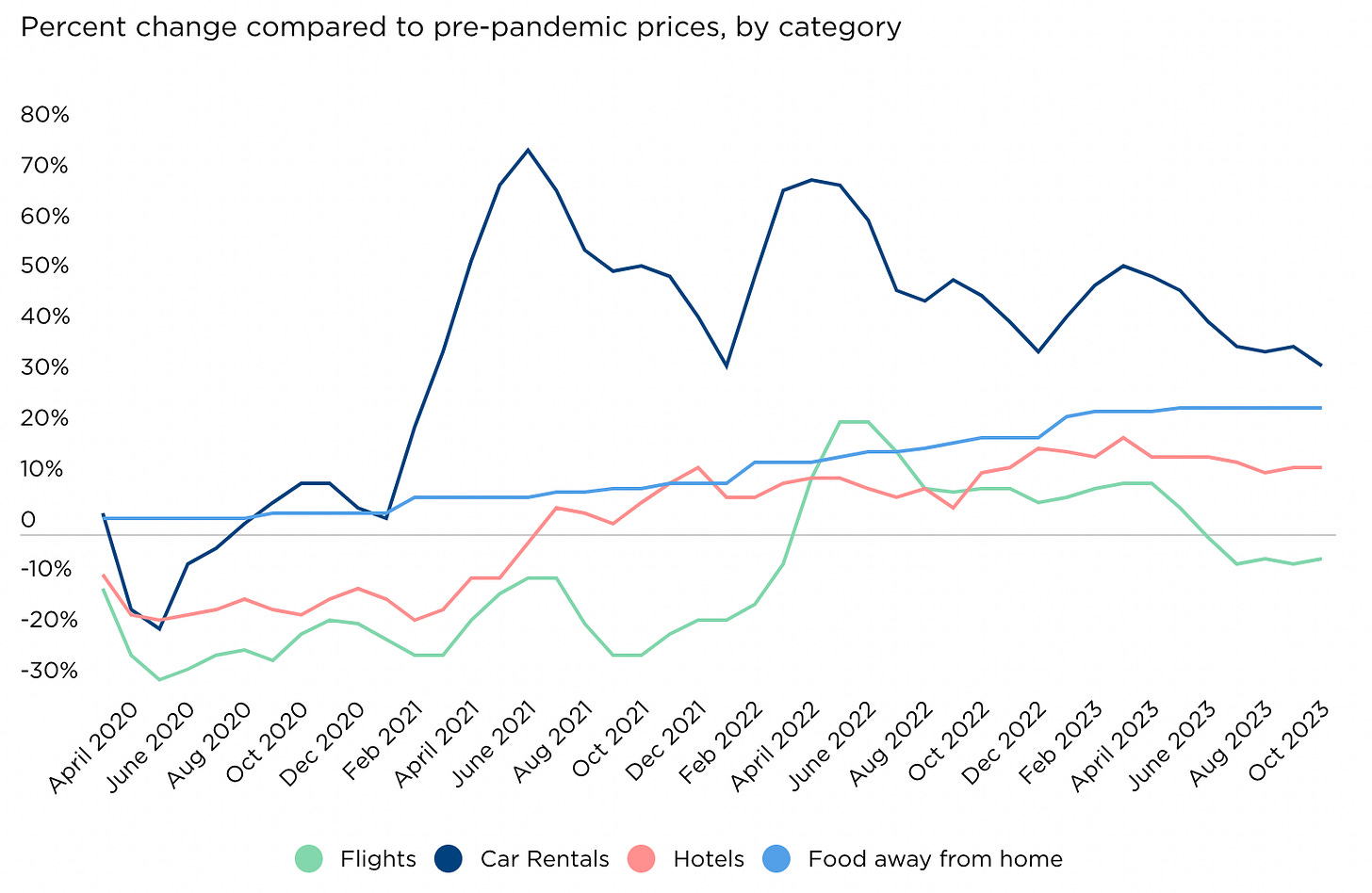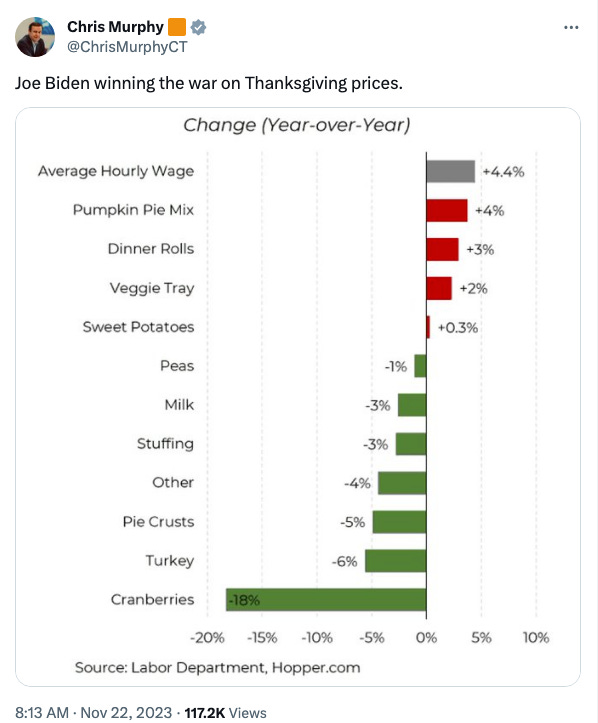Why Turkey, Eggs and Air Travel Just Got Cheaper
The long tail of greedflation may be subsiding, just as a federal jury cracks the longstanding egg cartel. Plus antitrust action on airlines and the turkey industry are likely delivering lower prices.
Welcome to BIG, a newsletter on the politics of monopoly power. If you’d like to sign up to receive issues over email, you can do so here.
Hi, this is Lee Hepner, I’m an antitrust lawyer filling in for Matt while he’s (mostly) away for the month. Over the past few weeks, I wrote about the banality of price fixing, how auto industry unions are setting industrial policy, and then co-wrote a piece about the establishment plan to roll back antitrust. I’ve got another longer piece coming next week about private antitrust enforcement, which it turns out is really important.
But for now, I thought I’d pause for some seasonally-appropriate gratitude. While you can’t put a price on being with family and friends over this holiday weekend, it turns out you can absolutely put a price on your Thanksgiving Dinner. And this year, that price is lower than last year’s record highs. On top of that, a jury cracked the egg cartel, and your holiday travel should be a little cheaper, too.
Turkey, eggs, and air travel – all things to be grateful for.
After sharp increases year-over-year in 2021 and 2022, the total price of Thanksgiving Dinner is down 4.5% in 2023, according to the annual Thanksgiving marketbasket survey of the American Farm Bureau Federation. The price of a 16-lb turkey is down slightly, after a dramatic increase the year prior. The price of cranberries is down 18%, whipping cream is down 23%, and the prices of pie crusts and russet potatoes are down, too.
The full meal is still 25% higher than the 2019 cost, but this year’s decrease is a good sign not just that inflation is cooling, but that efforts to crack down on corporate profiteering, or “greedflation,” are starting to work.
For the past two years, mounting evidence has suggested that corporations have used inflation as cover for coordinating price increases across the economy. Back in December 2021, BIG was one of the first outlets to push back on the argument that high inflation was the result of government spending and a tight labor market, instead suggesting that corporate profits were driving as much as 60% of inflation increases.
In short time, further studies showed that greedflation was more than a myth. A 2022 study by the Federal Reserve Bank of Boston found that increased concentration across the US economy since 2005 had caused a 25% increase in pass-through costs to consumers, amplifying the inflationary pressure from supply-chain disruptions like those caused by the much-ballyhooed avian flu. Jacob Linger, Hal Singer, and Ted Tatos similarly argued that inflation provided cover and a pretext for rivals to coordinate prices, because consumers were less likely to react harshly to price increases they attributed to other trends. The conventional wisdom is that concentrated industries are more susceptible to illegal coordination among rivals, but sophisticated data exchanges are now facilitating coordination in less concentrated industries.
There’s been a lot more attention and acceptance of the greedflation problem in the past year, and the persistent pushback from Larry Summers and other orthodox economists has lost some currency. That increased scrutiny makes it harder to use inflation as a pretext for price increases. While we’re talkin’ turkey, the Justice Department is enforcing against illegal coordination and price fixing by Agri Stats, which operates a data exchange among processors of 90% of domestic turkey sales. Litigation means that this coordination has likely stopped, at least for now, meaning firms can’t maintain high turkey prices through price-fixing anymore. Thus, prices are coming down.
It’s likely that price-fixing is more pervasive than we think. I’ve heard rumors of similar data exchanges among car dealers and rental car companies, and it’s unlikely that large corporations with sophisticated pricing models are leaving money on the table in other industries, either.
Politically, it’s not obvious to consumers that there’s policy action behind these pricing moves, though two Senators - Elizabeth Warren and Chris Murphy - are making that point, and I suspect you’ll hear more of that messaging.
Cracking the Egg Cartel
There’s more to be grateful for, including yesterday’s big news that a federal jury in Illinois cracked the egg cartel involving major egg producers Cal-Maine and Rose Acre Farms and facilitated by trade groups like the United Egg Producers (UEP). The lawsuit alleged that Cal-Maine and Rose Acre, among others, conspired to artificially suppress the supply of eggs and inflate the cost of eggs for major food retailers. (Some side-dish intrigue: Rose Acre is the family company of Republican candidate for U.S. Senate in Illinois John Rust, who was until very recently the company’s chair.)
The details of the scheme were laid out mostly in open court over the past month, and revealed that UEP had instructed egg producers to prematurely reduce flocks and artificially constrain egg output when egg prices dipped. In cases involving third-party information exchanges, like those facilitated by UEP, courts have made it difficult to allege that competing producers actually agreed to follow those recommendations. But UEP facilitated that agreement by publishing the names of their member producers in a newsletter, allowing rival egg producers to reliably predict that their competitors would be acting in lock-step with UEP’s recommendations.
The egg cartel allegations date back decades, but in recent years provided another potent example of corporate profiteering under the pretext of inflation. As egg prices more than doubled and profit margins increased five-fold in recent years, it seemed that egg producers were doing remarkably well despite horror stories of avian flu and skyrocketing feed costs. Groups like Farm Action helped crack the case, and now we’ve got a jury in Illinois to thank, too.
BIG is a reader-supported newsletter focused on the politics of monopoly and finance. This is journalism and advocacy that challenges power, so please consider a paid subscription. You can always get lies for free. The truth costs a few bucks, but in the long run it’s much cheaper. You can subscribe by clicking here.
Flying Just Got Cheaper, Too
Thirty million Americans are expected to travel by plane for the Thanksgiving holiday weekend, up 6 percent over 2019. Of course, the intervening years saw massive disruption in the travel industry, including a pilot shortage that was self-inflicted by compulsory early layoffs, and meltdowns such as the one last Christmas that impacted 2 million travelers. But much of the price hikes were a result of airlines collectively trying to cut capacity and hike prices. That seems to be over, at least for now.
With the government breaking the American Airlines-JetBlue Northeast Alliance in an antitrust suit, American Airlines is now expanding in Philadelphia. And with the JetBlue-Spirit merger on hold in a trial, the rest of the industry has no choice but to compete over routes via lower prices and more service.

As a result, now airfares are down, too. October 2023 airfares dropped 13.2% compared to a year prior, and 5.3% from pre-pandemic levels in October 2019. There’s some speculation that flight demand is down, which may be true in some cases but doesn’t exactly square with the record number of people traveling by plane this weekend. And of course, these patterns are going to look very different based on the number of airlines competing for specific routes, or for lower-demand routes that may simply be offering better deals to get people flying somewhere new.
Flying is still annoying and loaded with junk fees that can obscure the true cost of travel, like extra tacked on fees for seat reservations or for carry-on bags (which were almost universally complimentary until recently.) And readers of BIG will be familiar with our broader rebuke of the post-1978 deregulated industry. Generally, though, it’s good to see some relief on airfares as we head into the busiest travel season of the year.
That’s all for now, a small dose of Thanksgiving gratitude, and some tangible results from anti-monopoly policies. May the only thing fluffier be that bowl of mashed potatoes.
Thanks for reading!
Please send us tips on weird monopolies, stories we’ve missed, or comments by clicking on the title of this newsletter. And if you liked this issue of BIG, you can sign up here for more issues, a newsletter on how to restore fair commerce, innovation, and democracy. And consider becoming a paying subscriber to support this work, or if you are a paying subscriber, giving a gift subscription to a friend, colleague, or family member.
If you want to reach me, my email is Lee.a.hepner (at) gmail.com.
Thanks,
Lee Hepner





Just saw the news today that Open AI added Larry Summers to their board of directors. I don't know about you all, but that prospect chills my bones.
Can't wait for Larry to tell us all how great it is for the economy and stock market that the AI have decided to liquidate 70% of us into soylent. :P
Why does everyone ignore that we have been having record inflation in housing, education, and healthcare for 20+ years? Food, gas, and travel take up much less of our spending than those three fked inflated things.
The reason? Finance capitalism... It's a modern form of serfdom.
Aholes make money merely by owning things. They produce NOTHING.
It's parasitic and somehow everybody was asleep because they thought they could be wealthy too.
George Carlin was right... It's called the American dream because you gotta be asleep to believe it.